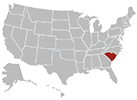
Several different types of jobs are dedicated to helping people every day.
Some occupations are very well-known and obvious, such as firefighters, police officers, and doctors, but there are also less obvious types of jobs that involve helping people as well.
One of these less obvious job roles is a professional recovery coach.
What is a professional recovery coach?
A professional recovery coach is a person who has gone through the path of addiction recovery and uses those experiences and additional training to help other people on their path to recovery.
Page Navigation
- Steps to Become a Professional Recovery Coach in South Carolina
- Schools in South Carolina
- Recovery Coach Representative Schools in South Carolina – Summary Table
- Salary
- Frequently Asked Questions
- Does South Carolina have any special certification requirements for professional recovery coaches?
- What are the pros and cons of becoming a professional recovery coach in South Carolina?
- Do I need to renew my certification as a recovery coach? If so, how often do I need to renew my certification?
- What education requirements does South Carolina require to become a professional recovery coach?
Steps to Become a Professional Recovery Coach in South Carolina
One of the first steps to becoming a professional recovery coach in South Carolina is taking a training course or training program in preparation for a certification exam.
In the state of South Carolina, it is required to get certification before becoming a professional recovery coach.
If you look up the requirements for becoming certified as a recovery coach in South Carolina, you will be able to find more details about what you need to do.
Most states require you to have a couple of years of personal experience in addiction recovery and be able to pass a background check.
Once you have the training completed and have passed your background check, you are eligible to sit for the certification exams to become a professional recovery coach.
After getting certified, you are now able to start looking for jobs and applying.
Just make sure your resume is updated to reflect all of your hard work and experience for the job.
Schools in South Carolina
There are many programs available to help you become certified as a professional recovery coach in South Carolina.
Here are some of the schools and programs in South Carolina that are available.
University of South Carolina
The University of South Carolina offers a 40-hour training course in partnership with the Courage Center.
This course includes the following:
- Roles and functions of a Recovery coach
- Components, guiding principles, and core values of recovery
- The many dimensions and components of recovery and recovery coaching
- Learning the skills necessary to enhance relationships
- Self-disclosure
- Stages of recovery
- Stages and applications of change
- Awareness of culture, privilege, and power
- Ethical and boundary issues
- Recovery wellness planning
- Practice skills
This training is offered in many different areas and is the first step in becoming certified as a peer support specialist in South Carolina.
This organization, South Carolina Self Help Association Regarding Emotions, or South Carolina SHARE, offers online Peer Support Specialist Certification training free to people who want to become certified in that profession.
This training covers 13 domains, including:
- Recovery Principles
- Peer Support Practice
- Cultural Competence
- Communication
- Recovery and Personal Wellness Goals
- Whole Health Approach to Services
- Managing Crisis and Emergency Situations
- Group Facilitation
- Advocacy
- Use of Recovery Tools
- Workplace Skills
- Professional Development
This training course is expected to be intense and consists of 40 hours of training with 12 hours of homework and a final presentation.
The Courage Center
The Courage Center offers its training course in many different places, including S.C. SHARE and the University of South Carolina.
This course consists of 40 hours of intense training.
The information about the course can be found on the Courage Center website as well as the websites for the University of South Carolina and the SC SHARE organization.
Erickson Coaching International
Erickson isn’t necessarily a school based in South Carolina, but it is an international coaching school dedicated to coaching, whether it be a life coach, recovery coach, or some combination.
The Art and Science of Coaching Program is made up of two courses:
the essentials course and the advanced course.
Each course is made up of two parts.
Recovery Coach Representative Schools in South Carolina – Summary Table
Top 4 Schools in South Carolina
| School Name | Address |
|---|---|
| University of South Carolina | Columbia, SC 29208, United States |
| South Carolina Self Help Association Regarding Emotions (S.C. SHARE) | 1823 Gadsden St, Columbia, SC 29201, United States |
| The Courage Center | 860 Park Rd, Lexington, SC 29072, United States |
| Erickson Coaching International | 8939 S Sepulveda Blvd Ste 102, Los Angeles, California, 90045, United States |
Salary
Let’s talk about the salary of a professional recovery coach at the state level as well as the national level.
For a professional recovery coach, the average in South Carolina falls just below the national average at $32,418 with the low end of the range being $29,063 and the high reaching approximately $36,258.
The salary for a recovery coach in the United States hits around $34,337 with the high reaching around $38,404 and the low starting at around $30,784.
Annual Salary Range:Average Salary of Professional Recovery Coachs in South Carolina
| City Name | Salary |
|---|---|
| Columbia | $31,818 |
| Charleston | $32,608 |
| North Charleston | $32,608 |
| Greenville | $32,445 |
| Rock Hill | $33,798 |
| Mount Pleasant | $32,608 |
| Spartanburg | $32,273 |
| Sumter | $30,704 |
| Hilton Head Island | $32,057 |
| Aiken | $32,036 |
Regional Salary in South Carolina
| Region | Employed | Avg. Annual Salary | Avg. Hourly Pay | Top 10% Annual Salary | Bottom 10% Annual Salary |
|---|---|---|---|---|---|
| Charleston-North Charleston, SC | 650 | $59,480 | - NA - | $97,320 | $21,280 |
| Columbia, SC | 630 | $82,580 | - NA - | $183,290 | $21,800 |
| Florence, SC | 60 | $51,910 | - NA - | $81,080 | $22,670 |
| Greenville-Anderson-Mauldin, SC | 450 | $64,310 | - NA - | $136,960 | $20,640 |
| Hilton Head Island-Bluffton-Beaufort, SC | 110 | $48,110 | - NA - | $78,400 | $23,680 |
| Myrtle Beach-Conway-North Myrtle Beach, SC-NC | 260 | $55,140 | - NA - | $86,930 | $18,720 |
| Spartanburg, SC | 220 | $52,370 | - NA - | $75,150 | $24,110 |
* Employment conditions in your area may vary.
Many people have asked the following questions regarding becoming a professional recovery coach in South Carolina.
Frequently Asked Questions
Does South Carolina have any special certification requirements for professional recovery coaches?
Most states, including South Carolina, require state certification to become a professional recovery coach.
Most programs for certification in South Carolina use a training course developed by the Connecticut Community for Addiction Recovery and hosted by The Courage Center.
The training course takes place at different times throughout the year, so it is important to keep watch for when the next one will take place.
What are the pros and cons of becoming a professional recovery coach in South Carolina?
There are many pros and cons to any job.
One big pro to becoming a professional recovery coach in South Carolina is that you get to help other people on their journey to addiction recovery.
One con to becoming a professional recovery coach is that not everyone can be one.
If you haven’t been on the path of addiction and recovery, you won’t be able to be a recovery coach.
That is one of the requirements for getting certification and getting hired as a professional recovery coach.
Do I need to renew my certification as a recovery coach? If so, how often do I need to renew my certification?
Most places require you to renew your certification every two years with additional continuing education courses every couple of years.
What education requirements does South Carolina require to become a professional recovery coach?
The first requirement to become a professional recovery coach is a high school diploma or a GED.
You also have to have some additional training to be eligible to take the certification exams to become certified as a professional recovery coach.





